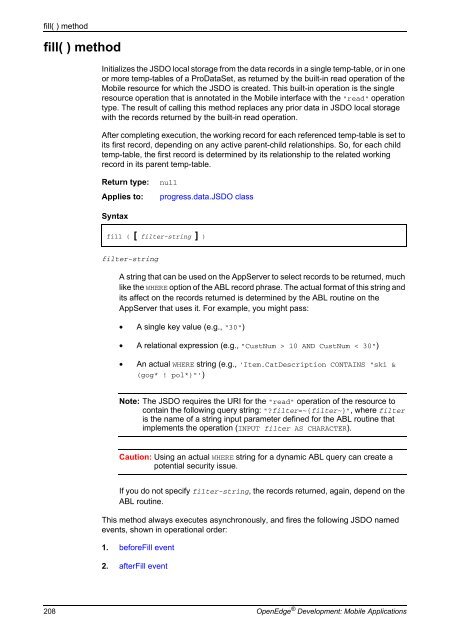OpenEdge Development: Mobile Applications - Product ...
OpenEdge Development: Mobile Applications - Product ...
OpenEdge Development: Mobile Applications - Product ...
Create successful ePaper yourself
Turn your PDF publications into a flip-book with our unique Google optimized e-Paper software.
fill( ) method<br />
fill( ) method<br />
Initializes the JSDO local storage from the data records in a single temp-table, or in one<br />
or more temp-tables of a ProDataSet, as returned by the built-in read operation of the<br />
<strong>Mobile</strong> resource for which the JSDO is created. This built-in operation is the single<br />
resource operation that is annotated in the <strong>Mobile</strong> interface with the "read" operation<br />
type. The result of calling this method replaces any prior data in JSDO local storage<br />
with the records returned by the built-in read operation.<br />
After completing execution, the working record for each referenced temp-table is set to<br />
its first record, depending on any active parent-child relationships. So, for each child<br />
temp-table, the first record is determined by its relationship to the related working<br />
record in its parent temp-table.<br />
Return type: null<br />
Applies to: progress.data.JSDO class<br />
Syntax<br />
fill ( [ filter-string ] )<br />
filter-string<br />
A string that can be used on the AppServer to select records to be returned, much<br />
like the WHERE option of the ABL record phrase. The actual format of this string and<br />
its affect on the records returned is determined by the ABL routine on the<br />
AppServer that uses it. For example, you might pass:<br />
• A single key value (e.g., "30")<br />
• A relational expression (e.g., "CustNum > 10 AND CustNum < 30")<br />
• An actual WHERE string (e.g., 'Item.CatDescription CONTAINS "ski &<br />
(gog* ! pol*)"')<br />
Note: The JSDO requires the URI for the "read" operation of the resource to<br />
contain the following query string: "?filter=~{filter~}", where filter<br />
is the name of a string input parameter defined for the ABL routine that<br />
implements the operation (INPUT filter AS CHARACTER).<br />
Caution: Using an actual WHERE string for a dynamic ABL query can create a<br />
potential security issue.<br />
If you do not specify filter-string, the records returned, again, depend on the<br />
ABL routine.<br />
This method always executes asynchronously, and fires the following JSDO named<br />
events, shown in operational order:<br />
1. beforeFill event<br />
2. afterFill event<br />
208 <strong>OpenEdge</strong> ® <strong>Development</strong>: <strong>Mobile</strong> <strong>Applications</strong>
















